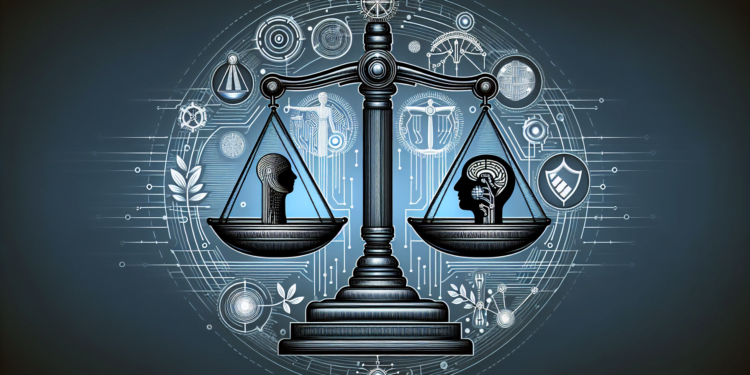Artificial Intelligence (AI) has transcended the realm of science fiction to become a tangible reality that increasingly permeates various aspects of our everyday life. Its exponential development poses not only technological advancements but also significant ethical challenges. In the following lines, we will technically and deeply address the key concepts associated with ethics in artificial intelligence, aiming to provide a comprehensive analysis that reflects both current concerns and future perspectives in the field.
Fundamental Principles of Ethics in AI
Before diving into specific terms and controversial issues within the industry, it is crucial to establish a basic theoretical framework. Ethics in AI deals with questions about morality and the right principles to follow in the creation, distribution, and use of AI systems. The confluence of AI and ethics has led to concepts such as transparency, justice, non-maleficence, accountability, and privacy.
Transparency in AI
Transparency refers to the clarity with which AI algorithms and decision-making processes can be understood and evaluated. This implies not only the availability of open-source code but also the ability to interpret AI decisions in a manner comprehensible to users and those affected by its decisions. A transparent AI system allows for detailed scrutiny of its functioning, which reinforces trust and facilitates the identification of biases and errors.
Justice and Fairness in AI
Justice aims to ensure that AI systems do not perpetuate discrimination or bias. It strives to provide equal opportunities and benefits, preventing the development of technologies that unfairly favor certain groups over others. For example, active research investigates how algorithms can display unconscious racial or gender biases and how to mitigate these effects.
Non-Maleficence
The principle of non-maleficence in AI implies that developments should not harm humans. This translates into avoiding physical, psychological, or social harm and implementing safeguards against potential misuse or failures of intelligent systems.
Responsibility and Accountability
Responsibility in AI refers to the assignment of accountability for the actions and decisions of an AI system. This encompasses not only the developers and distributors of technology but also the end-users and those affected by it. Each party should be able to account for their influence on AI behavior.
Privacy and AI
Privacy is a growing concern in the age of AI. Intelligent systems require vast amounts of data, some of which can be extremely personal. Ethics in AI demands that these data be handled in a way that preserves individuals’ privacy and protects against misuse.
An Advanced Technical Perspective on Ethics in AI
Beyond the basics, ethics in AI currently focuses on how to incorporate these principles into the technical design and implementation of intelligent systems. This involves the development of frameworks for explainable artificial intelligence (XAI), which provides a window into the algorithm’s “thinking,” and methods for ethical audits of AI systems, assessing their compliance with established ethical standards.
Explainable Artificial Intelligence (XAI)
Research in XAI aims to make machine learning models, especially those known as “black boxes” like deep learning neural networks, interpretable by humans. Techniques such as LIME (Local Interpretable Model-agnostic Explanations) and SHAP (SHapley Additive exPlanations) have been developed to provide detailed and comprehensible explanations of AI decisions.
Ethical Audits and Regulatory Framework
To properly frame AI in an ethical context, tools and procedures are being developed to conduct ethical audits. These consist of systematic reviews of AI systems that weigh factors such as fairness, transparency, and accountability. On the regulatory front, guidelines and standards such as the GDPR in Europe, including the right to an explanation, or the IEEE P7000 series of standards related to ethics in autonomous and AI systems, are being crafted.
Comparison with Previous Works and Future Innovations
Compared to earlier approaches to computational systems, contemporary AI presents unique challenges in terms of complexity and autonomy. Past systems did not require as deep ethical reflection since their capacity for impact and autonomy was significantly lower. As AI becomes more advanced, we may see developments like autonomous ethical criteria technology, enabling AI systems to make ethical judgments on their own in complex situations.
Case Studies and Practical Applications
To illustrate the above concepts with concrete situations, case studies such as the use of algorithms in the criminal justice system can be considered, where bias in AI may lead to sentencing recommendations that discriminate against certain social groups. A detailed and technical examination of such cases highlights the current efforts and future needs of the industry to ensure that AI develops in an ethically responsible manner.
Conclusion
With the advancement of AI, ethics is not a post hoc reflection but a central axis that must lead the design, development, and implementation of intelligent technologies. This glossary underscores the critical importance of ethical principles in AI and how their correct application can have a profound positive impact on society. As we move towards an increasingly digitalized future, the intersection of AI and ethics will continue to evolve and challenge innovators, policymakers, and citizens alike. Each discovery and application must be carefully balanced on the scales of ethics to ensure that technology serves human well-being rather than to its detriment.






















